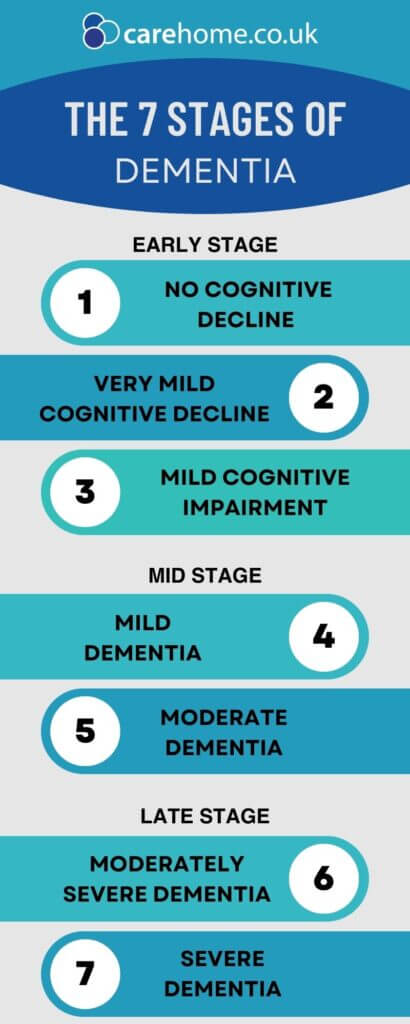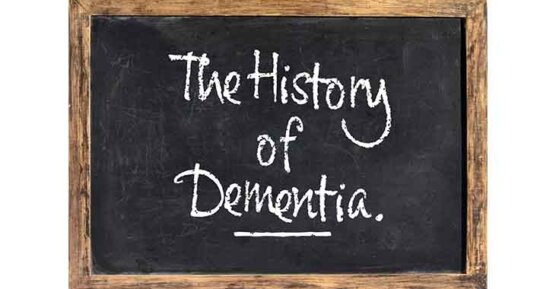
Page contents
- No cognitive decline (Stage 1 – early stage)
- Very mild cognitive decline (Stage 2 – early stage)
- Mild cognitive impairment (Stage 3 – early stage)
- Mild dementia (Stage 4 – mid stage)
- Moderate dementia (Stage 5 – mid stage)
- Moderately severe dementia (Stage 6 – late stage)
- Severe dementia (Stage 7 – late stage)
Page contents
- No cognitive decline (Stage 1 – early stage)
- Very mild cognitive decline (Stage 2 – early stage)
- Mild cognitive impairment (Stage 3 – early stage)
- Mild dementia (Stage 4 – mid stage)
- Moderate dementia (Stage 5 – mid stage)
- Moderately severe dementia (Stage 6 – late stage)
- Severe dementia (Stage 7 – late stage)
There are nearly one million people living with dementia in the UK, and the number of people with the disease is predicted to increase to over 1.6 million by 2050, according to Alzheimer’s Research UK.
The expected life span of a person post-dementia diagnosis is 10 years, but this can be much higher depending on a person’s age and symptoms, and at what point of the disease they receive their diagnosis.
Although dementia is not something we want to think about happening to a loved one, or even ourselves, having an awareness of the different stages could make it possible to spot the signs and symptoms at an earlier point.
The Global Deterioration Scale was developed by Dr Barry Reisberg and outlines seven different stages of progression for those suffering from dementia. These stages can also be compacted into three more generalised stages; early stage, mid stage and late stage.
The seven stages are:

No cognitive decline (Stage 1 – early stage)
Also referred to as no impairment or normal function, this stage is the first of three pre-dementia stages (includes stages 1-3).
During this first stage, a person will have no experience of memory loss or impaired brain function, and there will be no signs of this to healthcare professionals.
Very mild cognitive decline (Stage 2 – early stage)
This will be the first sign of any impairment, and is often associated with memory impairment experienced by a person in their old age. At this point, a person may experience slight gaps in their memories. In most cases, this won’t be evident to health care professionals or a person’s family or friends.
Symptoms can include:
- Temporarily forgetting familiar names.
- Not remembering where they placed an item (such as keys or glasses).
The average duration of this stage is debated, although it has been suggested to be over 10 years. This uncertainty is likely because it is difficult to pinpoint an exact start to these symptoms due to their association with old age or a generally poor memory, and they may not immediately appear as a red flag.
Mild cognitive impairment (Stage 3 – early stage)
This is the final stage of the three pre-dementia or ‘early’ stages.
At this point, the symptoms experienced in Stage 2 will heighten, and will likely become more noticeable to the person’s family and friends. Symptoms may also be picked up by healthcare professionals. Some people can be diagnosed with early-stage dementia at this point, but this is quite uncommon.
Common symptoms associated with stage 3 dementia can include:
- Forgetting or mixing up the names of relatives or other loved ones.
- Finding it difficult to remember the ‘right’ word when speaking.
- Reading but struggling to retain any of the information.
- A noticeable decline in work performance.
- Misplacing or losing important things (such as valuable possessions like jewellery).
- Struggling to locate familiar places. For example, a person may get lost walking or driving to a local shop (that they were previously familiar with).
- Quickly forgetting the names of people they were recently introduced to.
- Difficulty planning or organising things.
During this stage, a person may start to experience anxiety as their symptoms worsen. Anxiety may be mild, but can still negatively impact on a person’s confidence and self-esteem. A person may also deny any decline in their cognitive ability.
The average duration of stage 3 is estimated to be between 2 and 10 years.
Mild dementia (Stage 4 – mid stage)
Dementia can usually be diagnosed at stage 4 through tests and/or interviews and this is the most common stage of diagnosis. As with the previous stage, existing symptoms will develop further and continue to be more noticeable to the person and their family and loved ones.
In stage 4, symptoms can include:
- Finding it difficult to organise things, such as planning the ingredients for a meal or arranging a trip.
- An inability to remember recent or current events.
- Poor memory of general events that have happened in their own lives.
- Declining ability to perform more complex day-to-day tasks such as managing money and paying bills.
- Difficulty in performing complex mental tasks. For example, counting backwards from 100 in 7’s.
- Struggling to recognise people.
- Disorientation.
At this point, a person may also show behaviours which are out of character for them. For example, a normally outgoing and social person might start to withdraw, whereas a normally reserved person might suddenly become more outgoing and want to go out more.
Each stage is difficult for the person suffering with dementia, but this stage may be the most tumultuous in terms of accepting the situation. At this point, the person will usually experience no difficulty in remembering people’s faces or major events, and so it can be described as a ‘limbo’ stage in which cognitive ability remains largely the same, but with a progressive and noticeable decline. Anxiety will likely worsen too, and the person will tend to use denial as their major coping mechanism.
The average duration of this stage is between 2 and 8 years.
Moderate dementia (Stage 5 – mid stage)
Stage five begins the ‘mid’ stages of dementia. At this stage, the person will start to require help with day-to-day life, although they will usually be able to carry out personal care, such as washing and going to the toilet.
Along with the same symptoms as stage 5, a person in stage 6 may experience the following:
- Inability to remember personal details, for example, their address or phone number.
- Forgetting or confusing the names of relatives, such as grandchildren.
- Inability to recall significant life events, including birthdays or anniversaries.
- Increased disorientation. For example, becoming confused about what day it is, or where they currently are.
- Decline in reasonable judgement, such as choosing correct clothes for the weather.
- Difficulty with less complex mental tasks, such as counting backwards from 20 in 2s.
There may also be some confusion about things like the date and the season, and this can come with other difficulties such as a lack of ability to select appropriate clothing. Each of these factors require support to maintain the safety and wellbeing of the person.
The average duration of stage 5 is 18 months to six years.
Moderately severe dementia (Stage 6 – late stage)
Constant supervision is likely required at this stage and the person will usually show significant changes in their personality. They may also show anger or aggression to the people closest to them.
This may be the most difficult time for the loved ones of a person due to these drastic changes.
At this point, a person may fail to recall the names of close relatives (such as a spouse or children), although they will usually be able to differentiate between familiar and unfamiliar faces.
They might also find it difficult to remember significant personal life events as well as recent experiences and events, or they may recall these events slightly different to how they actually happened.
At this stage, symptoms might include:
- Struggling to carry out general personal activities, such as dressing themselves, maintaining personal hygiene and using the bathroom.
- Becoming easily lost and/or disorientated (becoming unaware of their surroundings).
- Experiencing delusional behaviour. For example, hearing or seeing things that are not there.
- Not wanting to be alone.
- Wandering and becoming lost.
- Disrupted sleep.
- Lack of awareness of their surroundings and/or recent experiences and events.
- Incontinence.
Additional care should have been established for the person prior to this stage, but if not, it’s essential to consider help now. The symptoms associated with this stage will be extremely difficult for the family or loved ones of a person to deal with alone, and professional help will ensure that a person receives the care they need. Establishing professional care will also allow loved ones to focus on the positive moments with the person.
Stage 6 will progress over an average of 2.5 years, and is usually less than four years.
Severe dementia (Stage 7 – late stage)
In the final stage of dementia, the person will require help with toileting, washing, eating and other daily activities. Motor skills will also likely deteriorate, meaning the person won’t be able to walk unaided. 24 hour care will be required.
Other symptoms include:
- Lack of ability, or a complete inability, to communicate verbally (sometimes a person may use words or phrases, but these tend to be unrecognisable or non-sensical).
- Abnormal reflexes and muscle growth.
- A lack of ability to control bodily movements. For example, a person may not be able to swallow, smile, or hold their head up without support.
- Hypersensitivity to touch.
The duration of stage 7 is typically less than three years. Many people with dementia will pass away before they reach this stage, this will be due to other illnesses or complications related to dementia.
Whilst it is beneficial to have an understanding of the different stages of dementia, it is important to be aware that these may not present themselves in the same way for everyone who is diagnosed. Some stages will occur in different orders, some may overlap, and some may be skipped entirely.
This is also the same for symptoms of dementia too; a person may develop certain symptoms but then experience a reduction in these; it isn’t always a straight path through progression.
Early diagnosis means that a person with dementia can be given the care that they need, making the process as manageable as possible for all involved.
Identifying dementia in the early stages also means that medical treatment can be sought to delay the later stages. Although it should be acknowledged that dementia is a progressive and, as of now, incurable disease, so whilst it is sometimes possible to delay progression, it is not possible to prevent it altogether.
Find your ideal care home
- Explore a wide range of care options and facilities
- Read independent ratings and reviews
- Connect directly with care homes to book a tour and discuss your needs


